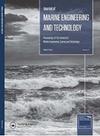A probabilistic bottom-up modelling approach for synthetic load profiles within the energy efficiency management of cruise ship cabins
IF 4.4
4区 工程技术
Q1 Engineering
Journal of Marine Engineering and Technology
Pub Date : 2023-07-28
DOI:10.1080/20464177.2023.2241313
引用次数: 0
Abstract
A reliable estimate of the electrical demand is a decisive factor in the design of electric board systems on cruise ships. This applies to all areas of the ship, including the hotel area with its up to several thousand cabins, which account for a non-negligible share of the total energy demand. In this paper, a simplified bottom-up model that can depict the electrical demand cabins with high temporal resolution and thus support marine and electrical engineers in developing future on-board power grids is presented. Key-card data will be used as a basis to easily access the behaviour of passengers on board. Another benefit is that the key data of the electrical consumers can be easily adapted to different types of ships and cabins. By including the ships route it is possible to precisely calculate the heat input through the glazing at any time of day and to determine its effect on the air-conditioning requirement. The model presented here is therefore not limited to certain regions but can be used globally. The functionality of the model is demonstrated on the example of a Caribbean cruise where the average electrical demand of a cabin is determined to 1.6 kWh per day.游轮客舱能源效率管理中综合负荷分布的概率自底向上建模方法
电力需求的可靠估计是游轮电板系统设计的决定性因素。这适用于船舶的所有区域,包括拥有数千间客舱的酒店区域,这在总能源需求中占不可忽略的份额。本文提出了一种简化的自底向上模型,该模型能够以高时间分辨率描述电力需求舱室,从而支持船舶和电气工程师开发未来的船上电网。钥匙卡数据将作为基础,方便地了解乘客在飞机上的行为。另一个好处是,电力消费者的关键数据可以很容易地适应不同类型的船舶和舱室。通过包括船舶路线,可以精确计算一天中任何时间通过玻璃输入的热量,并确定其对空调需求的影响。因此,这里提出的模型并不局限于某些地区,而是可以在全球范围内使用。该模型的功能以加勒比海游轮为例进行了演示,其中船舱的平均电力需求确定为每天1.6千瓦时。
本文章由计算机程序翻译,如有差异,请以英文原文为准。
求助全文
约1分钟内获得全文
求助全文
来源期刊

Journal of Marine Engineering and Technology
工程技术-工程:海洋
CiteScore
5.20
自引率
0.00%
发文量
0
审稿时长
>12 weeks
期刊介绍:
The Journal of Marine Engineering and Technology will publish papers concerned with scientific and theoretical research applied to all aspects of marine engineering and technology in addition to issues associated with the application of technology in the marine environment. The areas of interest will include:
• Fuel technology and Combustion
• Power and Propulsion Systems
• Noise and vibration
• Offshore and Underwater Technology
• Computing, IT and communication
• Pumping and Pipeline Engineering
• Safety and Environmental Assessment
• Electrical and Electronic Systems and Machines
• Vessel Manoeuvring and Stabilisation
• Tribology and Power Transmission
• Dynamic modelling, System Simulation and Control
• Heat Transfer, Energy Conversion and Use
• Renewable Energy and Sustainability
• Materials and Corrosion
• Heat Engine Development
• Green Shipping
• Hydrography
• Subsea Operations
• Cargo Handling and Containment
• Pollution Reduction
• Navigation
• Vessel Management
• Decommissioning
• Salvage Procedures
• Legislation
• Ship and floating structure design
• Robotics Salvage Procedures
• Structural Integrity Cargo Handling and Containment
• Marine resource and acquisition
• Risk Analysis Robotics
• Maintenance and Inspection Planning Vessel Management
• Marine security
• Risk Analysis
• Legislation
• Underwater Vehicles
• Plant and Equipment
• Structural Integrity
• Installation and Repair
• Plant and Equipment
• Maintenance and Inspection Planning.
 求助内容:
求助内容: 应助结果提醒方式:
应助结果提醒方式:


